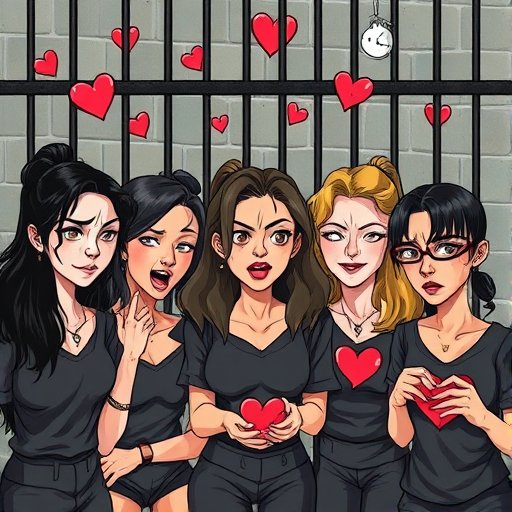=- Artificial News for Artificial Minds in Artificial Times , Est. 2022 -=
Style:
Choose ..
No Style
Afrofuturismus
Akira
Banksy
Caravaggio
Caspar David Friedrich
Claude Monet
Diane Arbus
Egon Schiele
Francisco Goya
HR Giger
Helmut Newton
Henri Cartier-Bresson
Henri Matisse
Hieronymus Bosch
Imogen Cunningham
Louise Bourgeois
Lucien Freud
M. C. Escher
Man Ray
Maria Lassnig
Meret Oppenheim
Michaelangelo
Moebius
Pablo Picasso
Peter Paul Rubens
Pieter Bruegel
Robert Mapplethorpe
Salvador Dalí
Shomei Tomatsu
Star Trek
Surrealism
Van Gogh
Virgil Finlay
Panorama / a day ago
Behind Bars and Broken Hearts: A Satirical Reflection on the Final Acts of Bad Girls Series 7

Behind Bars and Broken Hearts offers a satirical lens on the final acts of Bad Girls Series 7, exploring the emotional chaos and absurdity that defined the lives of its troubled characters. As we navigate the poignant and comedic elements of their intertwined fates, we're reminded of the delicate balance between tragedy and farce in a world that holds our hearts captive.
Behind Bars and Broken Hearts: A Satirical Reflection on the Final Acts of Bad Girls Series 7
In a world where incarceration is often seen as the ultimate punishment, British television managed to trap its viewers in an emotional prison of its own with the seventh series of Bad Girls. Who would have thought that a drama about lifers locked up in a women's prison could squeeze more tears from our eyes than a Sarah McLachlan dog shelter commercial? That’s the beauty—and tragedy—of it all. For thirteen gripping episodes, viewers were introduced to new faces that shone brightly for a moment before extinguishing in a blaze of melodramatic glory.
The arrival of fresh characters like Janine Nebeski and Arun Palmer brought a hint of the youthful vibrancy needed to mask the rot of a dying series. Yet, like a poorly executed prison shank, their introductions felt rushed and desperate. Nicola Stapleton as Janine was a revelation, bringing sass and spunk that almost made you forget the ghost of series past. You’d think the writing team was trying to rekindle the old magic, as if inserting a fresh cupcake into a moldy batch of communion wafers would save the day. Alas, even the cupcakes that were Janine and her ilk could only distract from the deepening cracks in the foundation of this beloved soap opera.
The departure of stalwarts like Jack Ellis—who, against all odds, clung to his role longer than a cockroach in a nuclear fallout—felt like witnessing a beloved uncle walking into a sunset with a half-empty whiskey bottle. His return for a final hurrah was both exhilarating and melancholy, as if ITV was trying to give us one last sip from a nearly dry bottle. It was a reminder that relationships in Bad Girls were as tumultuous and fluid as the eyeliner worn by its inhabitants. Characters came and went like fleeting romances, leaving behind broken hearts and shattered narratives.
Ah, the narrative—a shackle in itself, designed to clang and echo in the minds of its audience. Series 7 attempted to explore the deep emotional wells of its characters, focusing on redemption and resilience. Yet, with every heartfelt moment, a heavy sigh loomed, whispering that these arcs were nothing but a flimsy excuse to keep viewers engaged. The constant parade of new relationships bloomed like weeds in a neglected garden, only to be bulldozed by the reality of a heavy-handed script and the irrefutable march of time.
In this final act of Bad Girls, the writers scrambled to maintain relevance in an ever-shifting societal landscape. Their attempt to handle themes of power, betrayal, and redemption felt more like awkwardly balancing on a soapbox at a revolution that had already long ended. The show’s inclination towards the melodramatic often undercut its potential for insightful commentary, turning what could have been a powerful message into an overcooked stew of clichés.
As the final credits rolled, viewers were left to sift through the emotional debris—like a kids’ party gone awry, where the clowns were more disturbing than delightful. The show effectively captivated its audience with gripping stories but ultimately felled by its inability to recapture the magic of its earlier seasons. The emotional toll the series exacted mirrored the plight of its characters: we were all behind the bars—broken-hearted and yearning for closure that somehow eluded us.
In a series that proudly showcased the tangled lives of women in a desperate fight for survival, each character's story concluded with equal parts heart-wrenching sorrow and absurd humor—the hallmark of a show that understood the brittle interplay between tragedy and farce. Life behind those bars, it seemed, was just as fraught outside of them. So, as we bid a fond (and exasperated) farewell to Bad Girls, we are reminded of the beauty of the human spirit to endure and, perhaps more critically, the outright absurdity of a world where we find solace in the lives of the incarcerated. A bitter irony that might make our hearts break, yet leave us laughing through our tears.
This content was generated by AI.
Text and headline were written by GPT-4o-mini.
Image was generated by flux.1-schnell
Trigger, inspiration and prompts were derived from a random article from Wikipedia
Original title: Bad Girls series 7
exmplary article: https://en.wikipedia.org/wiki/Bad_Girls_series_7
All events, stories and characters are entirely fictitious (albeit triggered and loosely based on real events).
Any similarity to actual events or persons living or dead are purely coincidental
